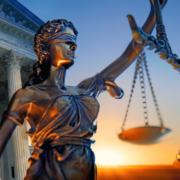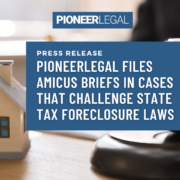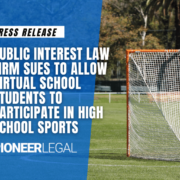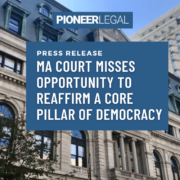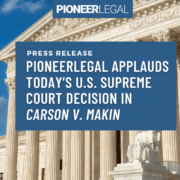MIAA to Allow Virtual School Students to Participate in Home School District Athletics
Under pressure from lawsuits, agency reinstates long-held policy
BOSTON – Pioneer Public Interest Law Center (PPILC) and the law firm of Sullivan & Worcester LLP are pleased to announce that after an 18-month legal battle, the Massachusetts Interscholastic Athletic Association (MIAA) has reversed its position and will once again allow children who attend Commonwealth Virtual Schools to play interscholastic sports in the school districts where they live.
“While I am deeply gratified that the MIAA leadership finally decided to abide by state and federal constitutional requirements, I am deeply disappointed that children have missed as much as two years of participation on their school sports teams,” said PPILC President Frank J. Bailey.
Nicholas M. O’Donnell, a partner at Sullivan & Worcester LLP who also represented the students, added, “I am filled with admiration for our clients, who stayed the course long after the rule change robbed them of their own seasons, to make a positive change for other students.”
In 2022, MIAA announced that students from Massachusetts’ two virtual schools — TECCA Connections Academy (TECCA) in Walpole and Greater Commonwealth Virtual School (GVCS) in Greenfield — were no longer eligible to participate in interscholastic athletics in their home districts, even though such participation had been successfully in place for seven years prior.
Under the earlier policy, virtual school students could participate in athletics at their local public high school if the heads of both the virtual and traditional schools agreed to it. There had never been an issue with the mutual agreement system, nor was there any outreach from MIAA about any possible change. Many school districts allow virtual school students to participate in all other extracurricular activities, such as theater and music programs.
The families of students at TECCA and GVCS challenged the MIAA’s decision.
In late 2022, PPILC, a Massachusetts public interest law firm, teamed with Sullivan & Worcester to file suit against the MIAA on behalf of two students who were suddenly prohibited from competing as part of their local district teams.
One plaintiff, who had attended public schools in his hometown for five years, joined the lawsuit during his sophomore year in high school. While attending his local public high school, he was relentlessly mistreated and bullied by his classmates — experiences that destroyed his self-confidence and were greatly exacerbated by an anxiety disorder.
By last year, his third at TECCA, he had gained the self-confidence to try out for and make junior varsity soccer team at his local public high school, where he had a great experience. But just before the first game of the season in September 2022, he was informed that he was no longer eligible to play. Having now missed two seasons, his hopes of playing high school soccer are over.
The other named plaintiff is an outstanding hockey player who is in line to be recruited at the highest level of collegiate hockey. He was adopted from another country at 18 months old and attended local public schools through ninth grade, but struggled with learning issues likely attributable to neglect before he was adopted.
After enrolling at TECCA nearly two years ago, he received the academic support he needed, and the online format can accommodate his busy club hockey travel schedule. The student has also competed as part of his local high school’s lacrosse team, but the new MIAA rule prevented him from continuing at TECCA.
The families of both students own homes and pay real estate taxes that support their local public schools. The plaintiffs are representative of the diverse student bodies at public virtual schools that also include students with medical issues, those seeking the flexibility to proceed at a slower — or, not infrequently, a faster academic pace — and students who are very involved with the arts. The schools provide districts and parents alike with a far less expensive option to private schools that address these needs.
After over a year of litigation, MIAA announced in October 2023 that it had reversed the decision to ban virtual school students from participating in local school sports. The decision was ratified in November.
“Pioneer Public Interest Law Center is dedicated to preserving families’ right to choose the educational environment that best suits their child’s needs,” Bailey said. “We will continue to protect those rights in and out of court.”



